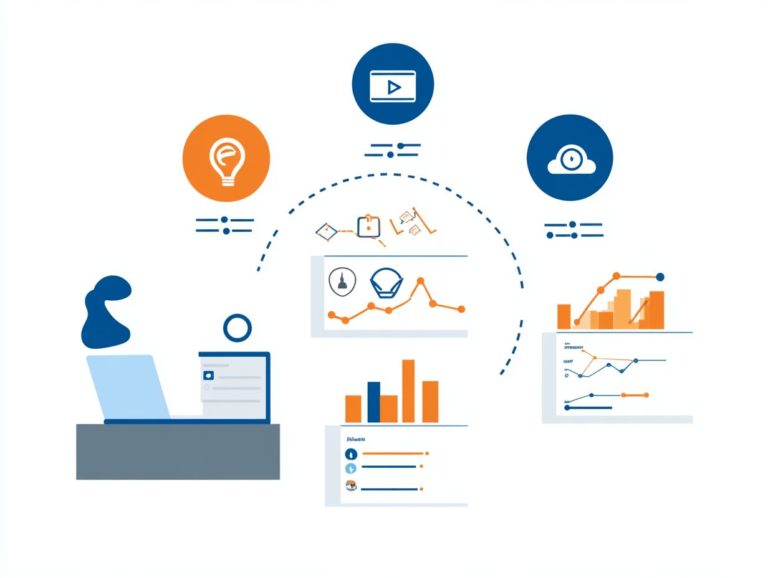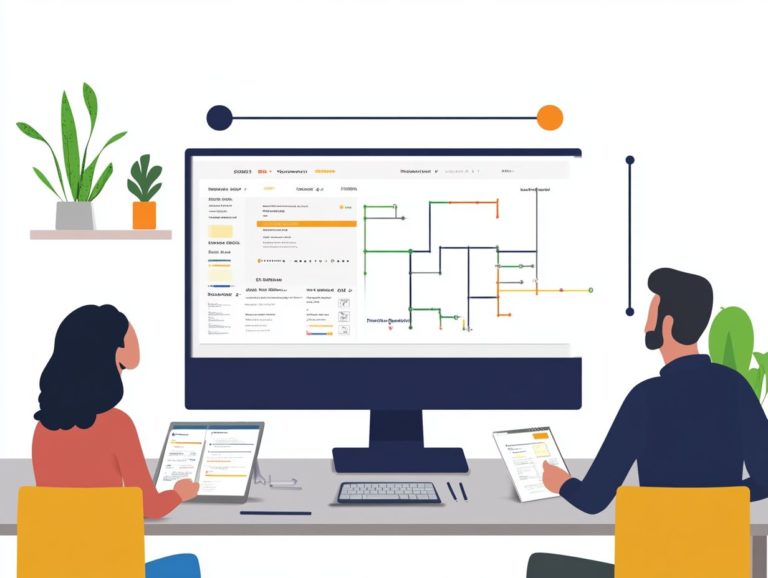“5 Role-Specific CRM Training Strategies”
In today s fast-paced business landscape, effective Customer Relationship Management (CRM) training is crucial for maximizing your team’s performance.
Generic approaches often miss the mark. This article delves into five tailored CRM training strategies specifically designed to meet the unique needs of various roles within your organization.
From pinpointing specific responsibilities to fostering a culture of continuous learning, each section uncovers how focused training can elevate your sales, customer service, marketing, and management teams alike.
Explore the benefits and potential challenges of implementing role-specific CRM training, and unlock the true potential of your workforce.
Contents
Key Takeaways:

- Identify roles and tailor training for maximum impact.
- Use hands-on training with real scenarios to boost retention.
1. Identify the Specific Roles and Responsibilities
Using a Customer Relationship Management (CRM) tool is essential for a smooth integration of CRM software, like Salesforce or Hubspot, into your business processes and sales pipeline.
By defining roles for sales professionals, marketing teams, and customer service representatives, you clarify individual contributions and enhance collaboration across departments.
Each role you establish plays a critical part in driving customer engagement. Effective communication strategies significantly influence customer perceptions and needs.
These clearly defined responsibilities promote accuracy in data management, which is vital for maintaining data integrity within the CRM.
When roles are well-understood, the insights gained become more precise, ultimately impacting overall business growth.
As team members grasp their responsibilities, user adoption of the CRM system improves dramatically. This allows employees to effectively leverage the technology tailored to their specific functions.
2. Tailor Training to Each Role
By tailoring CRM training to each role within your organization, you ensure that the unique training needs of sales professionals, customer service representatives, and marketing teams are addressed.
This approach helps them use the CRM more effectively.
Designing programs that focus on the specific functions and challenges associated with each position allows you to significantly boost your team’s performance.
For example, sales professionals thrive with targeted modules that sharpen their skills in using customer data to drive sales strategies, ultimately leading to improved conversion rates.
Customer service representatives acquire a deeper understanding of the interface, enabling them to resolve issues more swiftly and deliver personalized support.
Meanwhile, marketing teams benefit from specialized training that enhances their ability to analyze customer trends. This allows them to craft campaigns that truly resonate with their audience and improve overall customer satisfaction.
3. Provide Hands-On Training
Providing hands-on CRM training is crucial for fostering user adoption. This will empower you and your team to make the most of the CRM system.
By implementing interactive workshops and simulation exercises, you can engage in practical scenarios that reflect your daily tasks.
This immersive experience allows you to explore CRM metrics in a controlled environment, enhancing your grasp of complex concepts like data tracking, performance evaluation, and customer interactions.
As you gain confidence in navigating the software, you ll see how understanding its functionalities can shape your sales strategies.
Ultimately, this experiential learning approach will deepen your understanding of performance metrics and significantly contribute to overall sales growth.
Start implementing these strategies today to unlock the full potential of your team!
4. Use Real-Life Scenarios

Use real-life scenarios in your CRM training. This helps you engage with actual customer interactions and apply useful recommendations in your work.
These examples clarify customer journeys and show how various CRM features can be used effectively in different business contexts.
When you see practical applications of strategies, you grasp the nuances of customer engagement better. This can lead to improved morale and a stronger connection to your work.
Discussing these scenarios encourages knowledge sharing within your team. This creates a collaborative environment where insights flow freely. Such exchanges enhance problem-solving skills and drive overall performance, making everyone more effective in their roles.
5. Encourage Continuous Learning and Feedback
Encouraging continuous learning and feedback in your CRM training programs boosts employee engagement and drives improvements in training sessions and best practices.
To gather valuable feedback, implement regular surveys, one-on-one check-ins, and interactive workshops. This allows employees to share their experiences and suggestions openly.
You can use this information to refine your training programs, ensuring they stay relevant and practical. Ongoing training is crucial to keep your staff updated about system upgrades and changes in business processes, which can significantly impact CRM effectiveness.
By prioritizing adaptability, you elevate user proficiency, streamline operations, and create a more impactful customer relationship management strategy.
How Can CRM Training Benefit Different Roles?
CRM training provides distinct advantages tailored to various roles in your organization, like sales teams, customer service representatives, marketing professionals, and management teams. This training enhances their efficiency and effectiveness.
Equipping your sales teams with advanced CRM skills helps them manage leads more efficiently and track customer interactions in real time, ultimately boosting conversion rates.
Customer service representatives learn to address issues quickly and personalize communications, which fosters client loyalty and satisfaction.
For marketing professionals, mastering CRM tools allows them to design tailored campaigns that resonate with target audiences, enhancing engagement and response rates.
Meanwhile, management teams can use data analytics from CRM systems to make informed strategic decisions that drive growth and provide a clear return on investment.
What Are the Key Features of CRM Training for Sales Teams?
Key features of CRM training for sales teams include lead management tools, performance metrics tracking, and strategies to enhance sales performance through effective customer interactions.
These functionalities streamline sales pipeline management and provide valuable insights into individual and team performance. By using reporting tools, you can clarify your effectiveness and identify areas for improvement.
Offering personalized experiences to potential clients builds strong relationships and helps close deals. Tailoring your pitches based on previous interactions fosters trust and engagement, turning leads into loyal customers.
A well-designed CRM system becomes an essential asset, equipping you and your sales team with the skills and knowledge needed to thrive in competitive markets.
How Can CRM Training Help Customer Service Teams?

CRM training can dramatically improve customer service team performance. This leads to better customer satisfaction by managing service interactions more effectively and analyzing data insights.
Equipping representatives with the skills to use CRM tools helps them gain valuable insights into customer preferences. This knowledge allows them to provide personalized recommendations that create an engaging customer experience.
With CRM systems, agents can track issue resolution processes meticulously. They can address customer concerns promptly and accurately. Streamlined communication allows these trained representatives to build deeper connections with customers, fostering greater engagement and loyalty.
What Are the Benefits of CRM Training for Marketing Teams?
For marketing teams, CRM training is crucial. It equips you with essential skills in marketing automation, enabling data-based decisions and effective use of customer data for targeted campaigns.
A solid understanding of CRM insights helps refine audience segmentation strategies. This ensures your messages reach the right individuals at the right time.
By analyzing customer behavior and preferences, you can create personalized campaigns that enhance engagement and drive higher conversion rates.
Leveraging CRM data gives you enhanced performance metrics, allowing you to assess campaign effectiveness in real-time. This insight helps allocate resources more strategically, maximizing your marketing impact.
How Can CRM Training Benefit Management Teams?
CRM training gives management teams the vital skills they need to work effectively together. It ensures that CRM objectives align with your organization s overall goals.
Mastering these tools facilitates better communication across departments. This promotes data-driven decision-making, elevating service delivery significantly.
Trained managers can benchmark their team’s performance against industry standards. They can pinpoint areas for improvement and implement strategies that drive business processes forward.
This level of engagement boosts efficiency and elevates employee morale, as teams see their contributions translating into real success for the organization.
What Are the Potential Challenges of Role-Specific CRM Training?
While role-specific CRM training offers many advantages, it also comes with challenges. Keeping employee engagement consistent across diverse roles can be tricky.
The varying levels of tech-savviness among team members add complexity to training. Some employees adapt quickly, while others may struggle to keep up.
Resistance to change often stems from discomfort with new systems or fear of becoming outdated. To tackle these issues, consider a tiered training approach that accommodates different learning speeds.
Offering hands-on sessions for those needing more guidance can make a significant difference. Continuous support, such as access to resources and follow-up training, ensures everyone feels confident navigating the new CRM system.
Frequently Asked Questions

What are the 5 role-specific CRM training strategies?
The 5 role-specific CRM training strategies are sales training, customer service training, marketing training, technical/IT training, and management training.
Why is role-specific training important in CRM?
Role-specific training equips employees with the skills they need to use CRM systems effectively. This leads to better customer interactions and boosts overall business success.
How does sales training help in CRM?
Sales training teaches employees to manage leads and track sales opportunities using the CRM system. This makes sales reps more organized and efficient, increasing sales and revenue.
What does customer service training involve in CRM?
Customer service training shows employees how to handle inquiries and feedback with the CRM. This improves response times and enhances customer satisfaction.
How can marketing training benefit from CRM?
Marketing training helps employees identify potential customers and analyze data using CRM tools. This leads to more targeted campaigns and better customer engagement.
What is the role of IT training in CRM?
IT training teaches employees how to maintain the CRM system and solve problems. This ensures the CRM runs smoothly and fully supports business processes.






